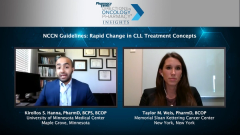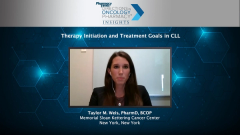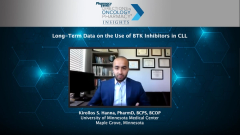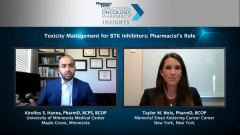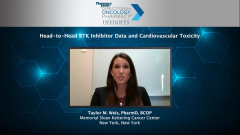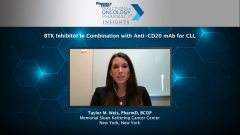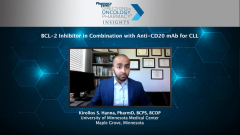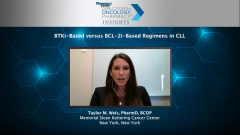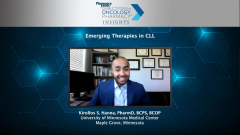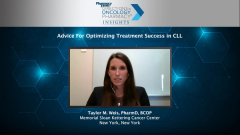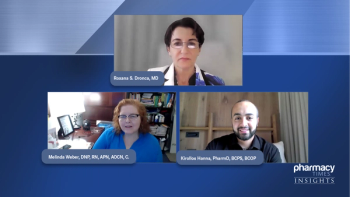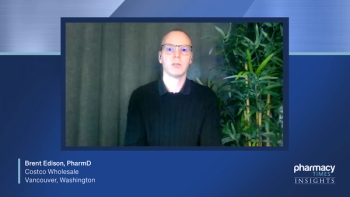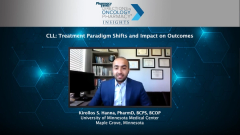
Advice for Optimizing Treatment Success in CLL
Experts share final thoughts and advice for clinicians in the community to help optimize treatment success in CLL.
Episodes in this series

Kirollos S. Hanna, PharmD, BCPS, BCOP: To conclude, Dr Weis, I think our attendees or audience would appreciate maybe 1 or 2 points, in terms of advice that we have for clinicians in the community on how we can optimize success of treatment. Please, I want you to lead us with this, and I think either of us could potentially provide a couple of points of advice for our attendees.
Taylor M. Weis, PharmD, BCOP: Of course, one of the biggest is involving the patient in all your decisions. Make sure they are an active participant. Make sure they are aware of the pros and cons of each treatment decision, so they can make a good decision with you as the expert on the data. The second important thing as a pharmacist is education, education, education. Inform the patients of what they can expect with these therapies. Often the [adverse] effects that they may see, for example, with BTK [Bruton tyrosine kinase] inhibitors, ibrutinib specifically, may include diarrhea within the first 2 weeks. Just by telling them that this will get better with time, and how to manage it home, could significantly decrease the rate of patients who are self-discontinuing at home due to toxicities. The other thing is with these novel agents, it’s very different than our chemoimmunotherapy-based approaches in terms of monitoring adherence. We’re not at home watching the patient, making sure they take their oral medication each day, and so be sure to check in on the patient. Ask them what’s bothering them. Ask them why they aren’t taking their medication. Ask them if they are refilling their medication. Just by asking those questions, you can get a lot of more information.
Kirollos S. Hanna, PharmD, BCPS, BCOP: Excellent points. The only couple of things I would add to that, on top of education, ensuring that pharmacists play a role here in terms of evaluating drug-drug interactions. They are critical in this patient population whether, it’s CYP3A inhibition with your BTK inhibitors, CYP3A inhibition during their BCL2 ramp-up phase and while patients are on therapy. Try to evaluate that. We talked about the ease of somebody walking in and getting a PPI [proton pump inhibitor] and if they are on acalabrutinib, how that could be problematic. Ensure that patients understand what the expectations are. If you’re going the BCL2 anti-CD20 route, look at that risk assessment in terms of TLS [tumor lysis syndrome], especially during the ramp-up. Know who’s responsible for getting the laboratory tests done. Make sure patients understand the lab schedule, because sometimes within 1 day, the patients could be coming to the clinic, if it’s not inpatient, to get 1 or 2 labs drawn while they are getting ramped up. That’s going to be very important for your patients. Then lastly,stress the importance of adherence and compliance on therapy. Out of some of the trials we discussed today, such as RESONATE-2, there have been sub-analyses that looked at dose intensity, and those who were nonadherent or noncompliant to therapy, had a worse PFS [progression-free survival], and there was a trend toward decreased overall survival. Thus, it’s very important that there are strategies in place to ensure that patients are adherent and compliant with therapy and to intervene when you need to as a health care provider.
With that, I want to thank my colleague, Dr Weis. I think this discussion has been extremely informative. I know I personally have learned a lot. To our viewing audience, we hope you found this Directions in Oncology Pharmacy® insights discussion to be rich and informative. Thank you so much for the opportunity and for listening to us today.
Transcript edited for clarity.
Newsletter
Stay informed on drug updates, treatment guidelines, and pharmacy practice trends—subscribe to Pharmacy Times for weekly clinical insights.

